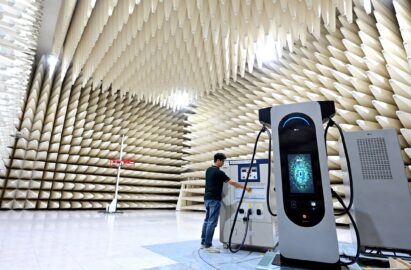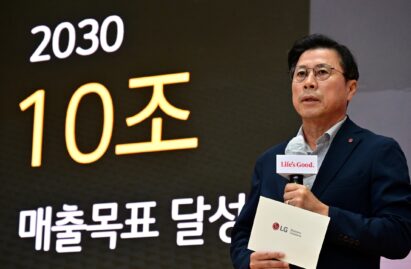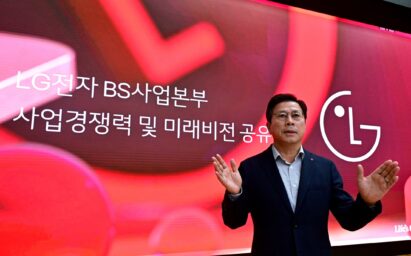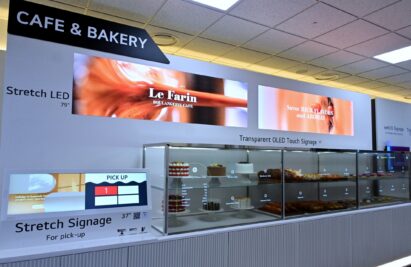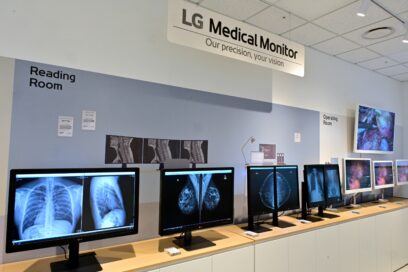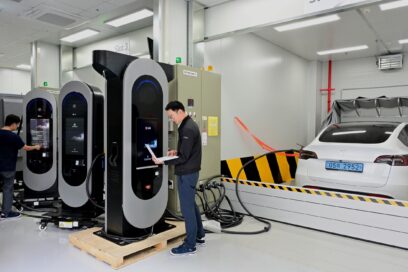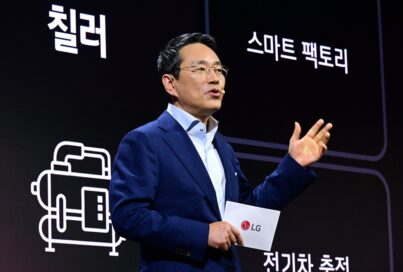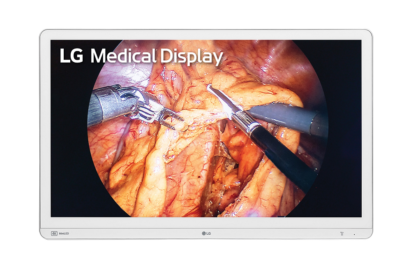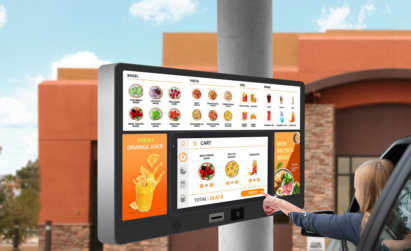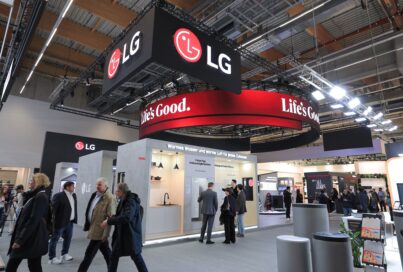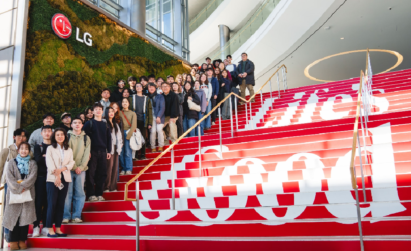LG Drives B2B Growth With a Focus on Customer-Centric Business Solutions
LG Aims to Expand Its B2B Offerings and
Build a Growth-Driven Portfolio in Emerging Sectors
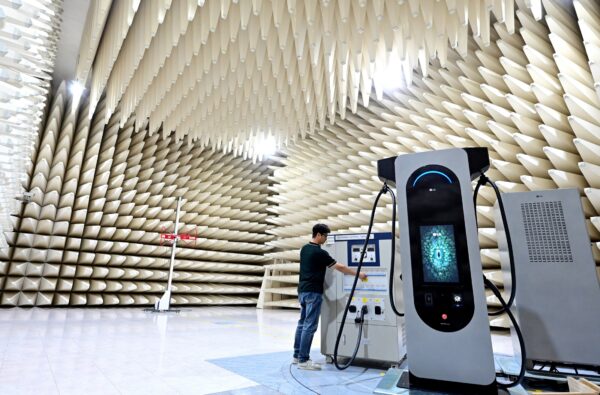
SEOUL, Oct. 10, 2024 — LG Electronics (LG) held a press conference today at LG Digital Park in South Korea to share its future vision for the B2B sector with domestic journalists. The company outlined its goal for the LG Business Solutions (BS) Company to achieve KRW 10 trillion in annual revenue by 2030.
At its 2024 Investor Forum in August, LG highlighted the acceleration of its B2B operations as one of the central components of its business portfolio innovation strategy. By 2030, the company expects that its B2B concerns will account for 45 percent of total sales.
LG plans to strengthen its leading B2B businesses, such as hotel and hospital TVs, digital signage and premium laptops, while also focusing on medical monitors and electric vehicle (EV) chargers to build a sustainable, growth-focused portfolio.
Additionally, the company is rapidly strengthening its B2B capabilities across a wide range of areas, including vehicle components, HVAC systems, built-in appliances and smart factory solutions. The expansion into mobility and new business segments is part of the company’s strategy to accelerate its business transformation.
Leading LG’s flagship B2B businesses, the LG BS Company offers customized digital signage for various commercial spaces, including hotels, retail stores, offices, schools and hospitals, as well as IT products ranging from high-spec monitors to LG gram laptops, commercial robots and EV charging solutions.
The B2B sector is less affected by economic fluctuations than B2C, resulting in comparatively stable revenue and profits. Another advantage of B2B is the “lock-in” effect, which typically leads to close, long-term relationships with customers and a virtuous cycle of mutual growth.
“Over the past 66 years, LG has accumulated valuable insights into its customers and the diverse spaces they occupy through its consumer electronics business,” said Jang Ik-hwan, president of LG Business Solutions Company. “Going forward, we will leverage this expertise to offer tailored services and differentiated solutions to our business customers, further cementing our reputation as a trusted partner in the competitive B2B market. The BS Company is seeking to double its current revenue, reaching KRW 10 trillion by 2030.”
Driving the Commercial Display Market with Premium Signage and Hospitality TVs
LG has gained a leading position in the B2B display solution market thanks to its top-tier commercial display technology, premium digital signage and strong performance in the global hotel and hospital TV segments. LG’s information display business has experienced steady growth since 2019, recording an average annual growth rate of seven percent.
LG will continue to expand its display solutions business with products tailored for various spaces. The focus will be on premium fine-pitch LED signage (including All-in-One LED and Micro LED models), a product category that has seen a double-digit rise in revenue each year.
At the forefront of this expansion is the cutting-edge LG MAGNIT Micro LED display. LG MAGNIT is offered in various formats, including an all-in-one model for conference rooms, a model designed for virtual production studios, a premium home cinema edition and a model with a separate power supply unit (PSU). Since 2020, MAGNIT has recorded an impressive growth rate, with its annual revenue growth nearing a twofold increase on average over the past four years.
Additionally, LG is strengthening its portfolio of innovative digital signage solutions with products such as the next-generation LG Micro LED display, which is set to launch later this year. LG has employed the latest AI technology for its upcoming Micro LED, both during the production process and to create intelligent image-quality algorithms that help ensure superior visual performance. As part of the manufacturing process, AI is used to assess and select each of the product’s approximately 25 million LED chips (based on a 136-inch model). Meanwhile, the AI processor applied to the LG Micro LED display analyzes and optimizes color and brightness in real-time to deliver optimal picture quality.
To drive future growth, LG is actively working to identify potential demand and will keep on adding to its diverse lineup of tailored hardware and software solutions for commercial spaces.
Preferred by customers around the world, LG’s hospitality TVs boast many user-friendly features, including the ability to wirelessly mirror personal devices screens via Google Chromecast or Apple AirPlay. Hotel guests simply scan the QR code displayed on the TV to watch content from their device on the TV’s larger screen. To protect users’ privacy, viewing history and connection data are automatically deleted upon check out.
LG continues to maintain its strong leadership in the global hospitality TV market, and is collaborating with renowned international hotel chains including IHG Hotels & Resorts, and Hyatt.
In addition to its hardware offerings, LG provides a variety of cloud solutions through its online B2B platform, LG Business Cloud. These include the LG DOOH Ads digital signage advertising solution, LG SuperSign Cloud and Pro:Centric digital signage and hospitality TV content management solutions, and LG ConnectedCare remote monitoring and management solution.
To accelerate its expansion into new business areas and enhance overall competitiveness, LG is fostering strategic partnerships with global B2B companies. It recently signed a memorandum of understanding with office solutions provider Ricoh to explore the development of comprehensive enterprise services.
Strengthening LG’s Position as a Leading EV Charging Solutions Provider
LG is set to expedite its growth in promising new business areas, with the company’s EV charger business standing out as an emerging “unicorn.” Through strategic partnerships and investment, LG is poised to increase its presence in the global EV charger market.
LG opened its EV charger production factory in the U.S. (Texas) in January of this year and in June reached an agreement with ChargePoint, a leading provider of networked charging solutions for EVs in North America. The two companies are collaborating to expand their businesses by boosting product sales through distribution channels, reinforcing their product portfolios and jointly developing next-generation solutions. Additionally, LG is leveraging its extensive B2B sales network in the U.S., established through its nationwide success in hospitality TVs and digital signage, to actively target the country’s increased demand for EV charging infrastructure. This includes the necessary charging framework for hotels, shopping malls and retail stores, as well as highway charging stations and depots.
LG aims to secure around eight percent of the U.S. fast charger market by 2030 and position itself as a global top-tier provider of EV charging solutions.
At present, LG offers six types of EV chargers, including 7kW and 11kW slow chargers, and 100kW, 175kW, and 200kW fast-charging models.1 In addition, the company is producing a 350kW ultra-fast charger for the North American market and plans to release two slow-charging models – 30kW and 7kW – targeting the European market, all scheduled to launch by the end of this year.
Furthermore, LG is proactively addressing concerns over EV charger safety by implementing various fire-prevention solutions.
The charging control system applied to LG’s EV chargers prevents overcharging, which is one of the leading causes of EV charging safety incidents. The control system automatically stops charging when the vehicle battery reaches 80 percent during fast charging and 100 percent during slow charging. Additionally, LG chargers are equipped with a load management system that allocates electricity based on the installation site’s power capacity, ensuring stable charging even with limited power availability.2
The installation environment and consumer safety are key considerations in the design of every EV charger that LG makes. The company’s 175kW fast-charging model operates reliably in extreme temperatures ranging from -35 to 55 degrees Celsius and boasts an IP55 rating for water and dust resistance, along with an IK10 rating for impact resistance. Additionally, LG EV chargers comply with Restriction of Hazardous Substances (RoHS) regulations for the use of ten harmful chemicals such as lead, cadmium and mercury during the manufacturing process.
Prioritizing Medical Monitors as a Key Growth Engine
LG is focusing on the medical monitor sector as a new growth driver for its IT business, with plans to become a global top-three medical monitor provider within the next five years.
Medical monitors are required to meet the medical device regulations of each country, as well as medical imaging display standards, such as DICOM Part 14. Delivering excellent image accuracy and reliability, these monitors are considered premium products with high entry barriers, and are recognized as high-value-added products. According to market research firm Omdia, the global medical monitor market is expected to reach approximately USD 2.5 billion in value by 2030. In markets such as North America and Europe, hospitals are required to use medical-grade monitors for the reviewing of medical images obtained from X-rays, endoscopies and other procedures. With these strict regulations in place, the market for medical-grade monitors is expected to grow significantly in the future.
Launched in 2016, LG’s medical monitor business has steadily expanded in size, achieving close to double-digit annual growth in North America and Europe. Its product lineup, which is now available in more than 50 countries worldwide, currently comprises 14 types of medical monitors – including clinical, diagnostic and surgical models – and six types of digital X-ray detectors (DXDs).
LG offers healthcare institutions a diverse range of medical monitors, including surgical monitors with Mini-LED technology, specialized diagnostic monitors for mammography and high-resolution displays with screen-split features. By adopting a turnkey solution approach, LG has enhanced its competitiveness in the global medical display market and set a solid foundation for future growth.
In 2023, the company made significant strides in the medical display segment by securing a four-year, EUR 10 million contract with Centrale d’Achat de l’Informatique Hospitalière (CAIH), France’s public hospital IT purchasing center, for the supply of medical monitors. Looking ahead, LG plans to integrate AI technology into the data analysis and solutions derived from its medical monitors and digital X-ray detectors, and is also considering an entry into the medical imaging equipment sector.
LG’s success in the B2B sector owes much to the company’s technology and knowhow accumulated over many years in the B2C market. Recently, LG is in discussions regarding a contract to supply a U.S. financial services company with custom-built, high-resolution monitors for a period of five years. LG has supplied dual monitors to a U.S. financial media company and provided in-flight entertainment (IFE) displays to international airlines.
# # #
1 LG’s 7kW and 11kW slow chargers and 100kW fast charger are available in South Korea, while the 175kW and 200kW fast-charging models are available in North America.
2 LG’s load management solution, which has already been applied to the company’s fast- and slow-charging EV charging solutions in North America, will be introduced in South Korea beginning next month.
